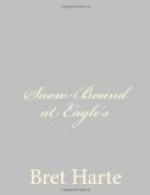There was a coquettish indication of this in the costume of Miss Kate Scott as she stepped out on the veranda that morning. A man’s broad-brimmed Panama hat, partly unsexed by a twisted gayly-colored scarf, but retaining enough character to give piquancy to the pretty curves of the face beneath, protected her from the sun; a red flannel shirt—another spoil from the enemy—and a thick jacket shielded her from the austerities of the morning breeze. But the next inconsistency was peculiarly her own. Miss Kate always wore the freshest and lightest of white cambric skirts, without the least reference to the temperature. To the practical sanatory remonstrances of her brother-in-law, and to the conventional criticism of her sister, she opposed the same defence: “How else is one to tell when it is summer in this ridiculous climate? And then, woollen is stuffy, color draws the sun, and one at least knows when one is clean or dirty.” Artistically the result was far from unsatisfactory. It was a pretty figure under the sombre pines, against the gray granite and the steely sky, and seemed to lend the yellowing fields from which the flowers had already fled a floral relief of color. I do not think the few masculine wayfarers of that locality objected to it; indeed, some had betrayed an indiscreet admiration, and had curiously followed the invitation of Miss Kate’s warmly-colored figure until they had encountered the invincible indifference of Miss Kate’s cold gray eyes. With these manifestations her brother-in-law did not concern himself; he had perfect confidence in her unqualified disinterest in the neighboring humanity, and permitted her to wander in her solitary picturesqueness, or accompanied her when she rode in her dark green habit, with equal freedom from anxiety.
For Miss Scott, although only twenty, had already subjected most of her maidenly illusions to mature critical analyses. She had voluntarily accompanied her sister and mother to California, in the earnest hope that nature contained something worth saying to her, and was disappointed to find she had already discounted its value in the pages of books. She hoped to find a vague freedom in this unconventional life thus opened to her, or rather to show others that she knew how intelligently to appreciate it, but as yet she was only able to express it in the one detail of dress already alluded to. Some of the men, and nearly all the women, she had met thus far, she was amazed to find, valued the conventionalities she believed she despised, and were voluntarily assuming the chains she thought she had thrown off. Instead of learning anything from them, these children of nature had bored her with eager questionings regarding the civilization she had abandoned, or irritated her with crude imitations of it for her benefit. “Fancy,” she had written to a friend in Boston, “my calling on Sue Murphy, who remembered the Donner tragedy, and who once shot a grizzly that was prowling round




